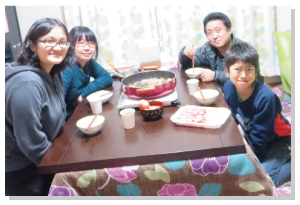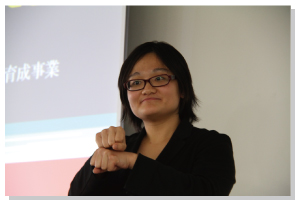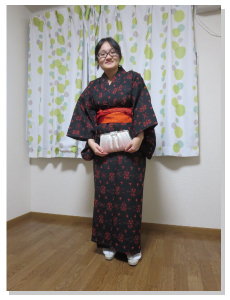- HOME
- Alumni News
- Yee Chen Loh (15th trainee)
- Lisa's Final Report
Lisa's Final Report
Hands Tune Hearts - What I Learnt from Deafblind People
I am Loh Yee Chen from Singapore. My nickname is Lisa. I am Deaf and I have retinitis pigmentosa, with nighttime vision problems and a narrower field of vision, which will cause full blindness in later adulthood. This eye disease is not curable. I am very concerned because Singapore does not have strong welfare support for the Deafblind community.
Three months of Japanese language training
I found studying Japanese language and Japanese Sign Language really resourceful. It helps me to build a good bond with Japanese people. Taking the national Japanese-proficiency test was a great experience for me even though I had to skip its listening section and as a result could not pass it. I am glad that I have been able to write a nice message in simple Japanese to thank the people I have met. Also, I managed to understand a little of what they were trying to say in Japanese.
Without Japanese Sign Language, I would not have been able to communicate with Deafblind people who were PC illiterates. I would have lost connection with them. Through Japanese Sign Language, I managed to access good information from many people I had met, including their personal experiences, solutions to problems, new ideas, and good advice.
Being fluent in English, I admit that it was very difficult to study Japanese, especially grammar. But it was really worth it! Japanese Sign Language is easy to learn but sometimes it is not easy to understand its exact meanings.
Homestay
This program was a special experience because for the first time in my life, I stayed together with two Deaf host families in Kagawa. I did not feel bored with the Deaf family because of the ease of communication. The Komoda family were very energetic and talkative. They took me to spots of beautiful nature as they knew of my great love of nature. Their son gave me a present, a bamboo toy. I had not seen the toy before. It was a very thoughtful gift from the boy.
The parents of the Deaf Kondo family were a gentle couple. They talked to me about their ancestry. Listening to them allowed me to see the roots of Japanese culture clearly. The Deaf Kondo family were kind. Mrs. Kondo taught me how to make ‘warabimochi.’ I found it very easy. They introduced me to a Deafblind lady from Tokushima. She was surprised to meet a foreigner like me because she had not met anyone from other countries in her life. I was grateful to see her very happy.
I would like to thank the Komoda family and Kondo family for spending time with me. It was one of the best moments in Japan.

Individual Training
Tokyo Deafblind Friendship Center and Japan Deafblind Association
From the beginning, I was surprised that Ms. Akiko Fukuda had multiple disabilities-she is deaf, blind, has limited mobility and is on oxygen support. I was impressed that she was always happy. She had a good sense of humour! She loved talking. One important point I have learnt from her is that a“Deafblind Guide-Interpreter’s role is like that of a social worker."
She put a lot of effort into coordinating my training on the welfare of the Deafblind community, and translated some Japanese materials into English so that I could better understand the Deafblind community. I appreciated her efforts! I would like to pamper her a lot when she visits my country.
I am grateful that I met many people at the Tokyo Deafblind Friendship Center and the Japan Deaflbind Association. Without them, I would never have known what the world of Deafblind people was like! To be honest, the Deaf community and the Deafblind community are not 100% the same.
Smile Support and Service Center for the Deafblind
I was on an internship at Smile in Osaka for almost two months. Mr. Kadokawa is an amazing person. With strong determination, he keeps figuring out how to solve problems or how to improve on the needs of the Deafblind. It impressed me during the training at Smile. My first job was to assist with the center's chores such as working in the kitchen, serving food to Deafblind people, and cleaning. In Singapore, I met very few Deafblind people, and therefore did not have a very good understanding of them. However, this job enabled me to associate with Deafblind people more, at a much deeper level. I learnt many things from them-for example, Deafblind people can chop food themselves, can dance, and can play drums.
I was very happy to give a talk on Singapore to the Deafblind people who did not know much about my country because of limited access to information. It was one of the best moments.
Medekiku TV
I went to Medekiku TV in Osaka for two weeks. Three main things I learnt from this training were: how to conduct a video interview; how to edit the video; and how to record the video in good surroundings. After this training, I felt confident in recording and editing video on activities of Deafblind people. With this ability, I can use film to educate the public or my future team about the Deafblind community.
Japan ASL Signers Society
Kumiko Sensei taught me many things about giving a presentation, especially despite my poor confidence. I did not have much experience of giving lectures except during my school days. I realized it took practice to build confidence. Also, it helped me to be more self-aware than before. I was glad that I was able to deliver my speech clearly on several occasions. My special thanks go to the JASS staff.

Annual events and festivals which were useful for all
During the 10-month stay in Japan, I visited Ear Day in Mita, the Nakanoshima Festival in Osaka, the Information Access Forum for Deaf in UDX, and the Information Access for the Deafblind in Asakusabashi, among others. It was an eye-opening experience!
Ear Day is held on March 3 every year. The aim is to celebrate the festival and to allow the Deaf community to access or exchange information. Like Information Access Forum in UDX, one can browse or learn new things from products or services displayed at company booths. I could not believe there were so many new things. I did not know there was such a thing as a hearing dog service! In Singapore, there is no forum for the Deaf community and not many similar events are held. This was why I did not have enough knowledge of products or services for the Deaf since I entered the Deaf school. To my surprise, the Deafblind community was participating in this event as a tenant. They set up a section so that they could share information on the Deafblind community with the public.
The Nakanoshima Festival is an annual festival for non-profit organisations to participate in, held in Nakanoshima, Osaka during Golden Week. At first, I thought it was just a regular festival but I realized I was wrong while helping out. NPOs were participating not only to earn money but to encourage the public to associate with people with disabilities.
My plans after returning from Japan
In future, I wish to see Singapore with full welfare support for the Deafblind community. I have a plan for enhancing the livelihood of the Deafblind community. After I return, I will find a good team to run my new project with.
First step: To set up training of Interpreter-Guides for future trainees
To conduct research and surveys of Deafblind people in each area
Second step: To create new activities for Deafblind people
Last step: To stabilize social engagement of the Deafblind community.
I will share my experience or knowledge not only with the Deafblind, but also with the Deaf community. I will work together with Deafblind and Deaf communities after leaving Japan. I want to set up an annual event in Singapore for people with disabilities, like the Nakanoshima Festival, to promote an inclusive society.
Words of appreciation
I would like to express my gratitude to the committees of JSRPD and Duskin AINOWA Foundation for having given me this great opportunity. If I had not been in Japan for this program, I would never have known about the world of people with disabilities. It has really become a turning point for me. My personal development has been enhanced as well as my professional development. In the past, I was afraid to meet other people with disabilities, but now I understand them more than before.
My thanks also go to the cleaning staff of Toyama Sunrise, my accommodation in Tokyo, for cleaning my messy room. Sometimes I was too busy to tidy up my room. One of them put a blanket on me when she found me sleeping. It was kind of her.
Meeting many people outside of the training has also helped me access new information or good advice. For instance, they shared their enriching experiences, personal stories, or solutions for problems. Thanks to everyone whom I met!





